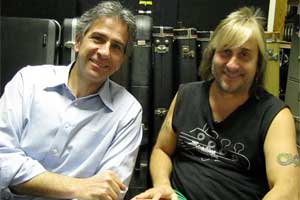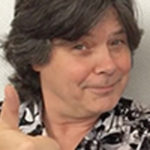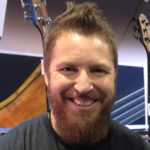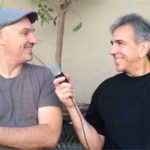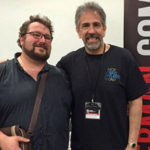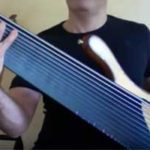“Superchops” bassist tells FBPO how he went from championship weightlifter to paraplegic in a split second. An incredibly powerful and inspirational story!
Exclusive interview with FBPO’s Jon Liebman
May 30, 2011
A native of Savannah, Georgia, Beaver Felton began playing bass at age 13 and spent his teenage years jamming in local cover bands. In 1979, Beaver moved to Orlando, Florida, having gained a reputation as one of the hottest bass players in the Southeast. While working in several bands in the Orlando area, Beaver got the idea for his Superchops bass instruction series, which he began marketing to several music publishers.
On June 26, 1985, while driving to a gig, Beaver was in an accident that resulted in a spinal cord injury, leaving him paralyzed from the mid-chest down. Ironically, at this time, Beaver’s career was about to rise dramatically. Just prior to the accident, Guitar Player magazine had chosen to feature Beaver in Mike Varney’s “Spotlight” column.
With his newfound credibility, Beaver was able to acquire some endorsement deals and launch his Superchops series. He developed and marketed several Superchops audio and videotapes, as well as other educational resources for Hot Licks and Hal Leonard.
Beaver is currently co-owner of Bass Central, near Orlando, Florida, with fellow bass player, Dave LaRue.
FBPO: Tell me about your musical upbringing. How did you end up a bass player?
BF: I started playing “air drums” to Beatle songs at a very early age. Several years later, I actually did play drums for a short while in my first band when I was about 12 years old. I had to borrow the drums, since I never owned any. Shortly thereafter, a friend, George Carellas, taught me a few things on guitar in a Kmart and I was hooked! I quit drums and bought a cheapie Harmony guitar at Woolworth’s. Shortly after that, the band decided they needed a bassist, so I got “drafted.” At first I played bass parts on the guitar, but soon got a $100 import bass. I still have it, forty years later!
FBPO: Who were your influences as an up-and-coming bass player?
BF: As Will Lee stated when answering the same question, I’ve had a multitude of influences over the years, including Will, by the way. My early influences were Paul McCartney, Jack Bruce, Chris Squire – still my favorite to this day – Stanley, Wyzard (from Mother’s Finest) and Jaco. Later in my career, it was Billy Sheehan, Vic Wooten, Dave LaRue and a handful of others. If you dig deep, most bass players will realize they’ve been influenced been many players, even on a sub-conscious level.
FBPO: What kind of gigs were you playing?
BF: School dances and church get-togethers were my very first experiences playing out. Then I started playing clubs at age 15. At my very first bar gig, a dive in Savannah, I looked about 11 years old. I was playing the first set and out came the strippers! Surprise! Then for the next few years, I played lots of other clubs, parties, dances, weddings, battle-of-the-bands, etc. I also did studio work in my later teens.
I finally went on the road at age 21 and started making a name for myself in the Southeast and Midwest, playing every type of club, including the “Chitlin’ Circuit,” the dance/hotel circuit, and the rock circuit. I played six to seven nights per week, forty-nine or fifty weeks per year, for nearly a decade. One band I was in from ’79 to ’80, Mantra, signed a record deal on a major label. When that deal “went south,” I changed groups for the next four years, still “chasing the dream” with original material.
FBPO: I understand you used to be a very serious weightlifter.
BF: Yep! To be clear, I was an Olympic-style lifter, not a bodybuilder or powerlifter. My best friend, George Carellas, got me into weightlifting. I entered the gym my first day, a “shrimp” at 85 pounds at age 15. I just wanted to gain some weight and muscle, but was soon attracted to competitive lifting, known as Olympic-style, which includes the overhead lifts: snatch and clean & jerk. This is the style you see in the Olympic games.
I trained several hours per day, six days per week and started competing at 16. I was in the 52-kilo flyweight division, weighing 114-and-a-half pounds. Two years later, I won the USA Junior Nationals in Fairfax, Virginia. The following year, I took first place and won Triple Gold Medals at the USA Nationals in Culver City, California, becoming national champion at age 19, fulfilling a personal goal. I could have gone to The Olympics the following year, but that would’ve required steroids in order to compete on that level, which I opted not to do.
Training with weights taught me discipline, sacrifice, short- and long-term goal setting and progressive training methods. I incorporated this exact methodology when working on my bass technique and still do to this day when woodshedding. Howard Cohen was my lifting coach. I must mention his name because he is, by definition, one of the most important people in my life. He indirectly played a role in my development as a bassist.
FBPO: Where did you find the energy and motivation to cultivate your music career after your accident?
BF: Wow, that was difficult, indeed. After being a champion weightlifter earlier in life, as well as a stage performer for the previous fifteen years, then ending up a paraplegic in a split second, I actually wanted to just “clock out.”
Obviously, I didn’t do that and the reason is because I had an enormous support group, consisting of friends, relatives and fellow musicians. Several national acts participated in benefits for me in Florida. Developing the instructional course gave me a reason to keep going, as well.
Since I could still play, I formed a band called Shut Up & Drive with a bunch of old friends. We played around Savannah. That band was extremely popular and successful from 1986-1992 and it allowed me to play regularly. I often refer to playing music as my only link to sanity, which was certainly the case in the first few years after my injury.
Around the same time, I also had the momentum of having just received international recognition in Guitar Player magazine by producer, Shrapnel Records owner and talent scout Mike Varney, right before the accident. Mike had also discovered many great players, like Billy Sheehan and Yngwie Malmsteen. Being featured was what I consider to be the “first domino” in my career from that point forward. I still thank Mike for choosing me out of hundreds of players from all over the world. Guitarist Tony MacAlpine and I were actually featured side by side in the same issue, August 1985.
FBPO: How did the Superchops idea come about?
BF: Before my accident, I’d been playing on the road full-time six to seven nights per week for nearly a decade. I’d already been through a record-deal-gone-bad on a major label with a well-known producer. I was in my late 20s and I started questioning whether I’d really make it as a recording/touring artist. I had to consider what would be my long-term financial stability.
Well before my accident, I’d always taught privately on the side, even while touring, and was in demand as an instructor. So I figured this may be an avenue to pursue, but on a larger basis. I mentally laid out a teaching system, created a few sample lessons on tape and sent them to several major instructional companies, such as Hot Licks, Star Licks, etc. They all responded with, “You’re a great player with great teaching methods, but you’re not well known,” so I didn’t have the credentials to attract sales. Again, this was before being featured in Guitar Player and before my accident, all of which happened in the same month, ironically, in 1985.
After the accident, since my disability pretty much terminated my career on the road, I had the time to develop the audiotape lessons and created my own instructional company, Superchops 4 Bass. With the credibility and visibility from Guitar Player, now I had an angle. I also entered and did well in solo contests by D’Addario, Guitar Player and Marshall Amplification, all of which added to my reputation on a large scale. Additionally, I played at a number of NAMM shows as a featured performer for Carvin, ART and Hipshot, as well a number of music store clinics, all of which helped my recognition even more. Interestingly, that’s how I met Vic Wooten, who had some of my audiotape lessons in the ’80s and came to see me play at the ART booth during a NAMM Show in Chicago. This was in 1989. I met him right after finishing my performance and getting offstage. He ended up sitting in and ART immediately offered him an endorsement and gave him some gear, as I recall. By the way, if you’re ever a featured performer, never let Vic take your stage, as I did! Bad move! [Laughs]
So, I produced, marketed, advertised and finally released the original audiocassette course in 1986. The course received great reviews, was used and endorsed by a bunch of famous players, such as Bill Dickens, Roy Vogt, Wally Voss, Vic Wooten, Randy Coven, Dave LaRue and Will Lee, and became a success.
The original course was about eleven separate audiocassette lessons. Due to the success of those, I expanded to nineteen. Afterwards, I produced videos, CDs, books, DVDs, etc. The lessons were all distributed internationally, which got my name out there even more. This attracted numerous endorsements and interviews and resulted in a lot of high visibility in musician trade mags, etc. I remember once seeing myself in three different locations of one particular issue of Bass Player magazine, which I felt was somewhat of a distinction. Great for my ego!
FBPO: What other education materials have you developed? Which ones are still available?
BF: In addition to those products put out by my own label, I was contracted by Hot Licks, Doug Marks’ Metal Method, Hal Leonard and MVP to produce more lessons. Yamaha was among a number of international distributors. I also wrote instructional columns for a number of large music mags, such as Guitar World, Bass Frontiers, Bass Player, Bassics, Guitar School, Guitar For The Practicing Musician, The Bass-Mint, The New York Music Paper, Peavey’s Monitor mag and a bunch of other smaller publications. I’ve had over a hundred instructional columns published nationally.
To summarize, what started with a dozen audiocassette lessons snowballed to about thirty-five tutorials on various labels and formats. Many are still available, although the bass instructional market is absolutely glutted with lessons, so mine aren’t currently in demand as much as they were in the ’80s and ’90s. The capital I made from the instructional materials ended up financing Bass Central, which is the store I currently own.
FBPO: Tell me about your store. It’s nice to see that there’s enough demand for a niche business that caters only to bass players!
BF: Well, the “10-cent tour” would be this: In about ’94 or ’95, the idea crossed my mind to open a bass-only store. There were already a few across the country, such as Bass Centre and Bass Northwest, both of which seemed to be successful. Actually, Mike Pedulla planted the seed when a private student of mine wanted a Pedulla bass. There were no dealers in Orlando, so I called Mike, whom I’d gotten to know over the years at NAMM shows. He suggested that my company, Superchops 4 Bass, effectively act as the retailer and sell the bass to my student through that. Wow, easy money, I thought!
After that, I did market research, went to NAMM shows, shared the concept with a bunch of bass gear manufacturers, who were totally supportive of the project and helped me a lot. Dave LaRue was a partner in the venture and, of course, his name lent additional credibility and recognition to the store. He’s always taught at the store on Saturdays, unless touring or recording with Steve Morse, Tony MacAlpine, Vinnie Moore, John Petrucci, Joe Satriani or other guitar gods, all of which have hand-picked Dave. He really has one of the most impressive resumes I’ve ever seen. His talent and ability are pretty much limitless.
Ever since a very modest beginning in 1996, the store’s been a success story, growing every year and adding more and more bass players to the staff. I also owe a lot to Scott Ryder a/k/a “Grasshopper,” who was first a student, then a friend, and ended up working with me at Bass Central pretty much since Day One. He’s still at Bass Central as Assistant Manager.
Beaver with FBPO’s Jon Liebman at
Beaver’s store, Bass Central, in Florida
BF: Ideally, I’d love to get back into more playing and writing. I’m not sure what’s in the cards for writing, but I’ve been in a number of local weekend cover bands and am now putting together another similar project.
Bass Central consumes an enormous amount of my time and energy. Plus, I’m happily married and my wife, Nancy, actually handles a lot of administrative duties for BC. We have 14-year-old daughter, Sarah. As anyone who has one knows, families require a substantial amount of time, of course, and are well worth it.
FBPO: What do you like to do that’s not necessarily musically oriented?
BF: Eat, sleep, exercise, watch the tube and hang out with my family.
